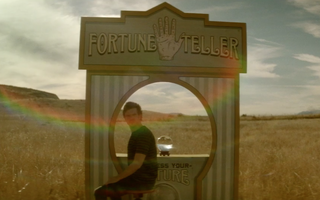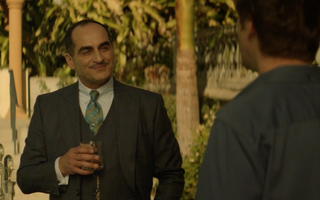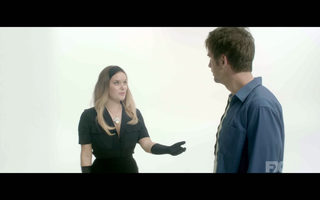{shortcode-766818fb2b23a4dba7c61633ff65466b5581b80a}“Is there a guy with, like, a basket on his head?”
A story “hangs a lampshade” when it veers into the implausible/cliché/surreal and, rather than explain itself, cheekily acknowledges this veering and moves on. At its best, lampshading preserves the audience’s trust by assuring them that their confusion is valid and, in the process, allows them a moment of camaraderie with the storyteller. At its worst, lampshading is lazy writing, replacing reason with unctuous self-awareness.
When “Legion” gives us women with mustaches, singing, then has a character say, “Wait, were there women with mustaches, singing?” it’s lampshading at its worst.
The bizarre has always been in “Legion”’s wheelhouse. After all, the first season featured Jemaine Clement as a jazz-loving telepath in an antique diving suit, living in an ice cube on the astral plane. Yet this willful strangeness used to have its own internal logic. In its first eight episodes, “Legion” planted the viewer firmly in the erratic mind of David Haller (Dan Stevens)—either a schizophrenic, the most powerful mutant in the world, or both. With David mediating what the audience sees of the show’s world, anything was fair game. The result was a thrilling, innovative season of television: Rom-com lovey-doveyness, paralyzing scares, superhero pyrotechnics, and Kubrick-worship all found their place in a narrative structure that ambitiously and successfully matched David’s experience of reality. The absurdity, the horror, and all the other glitches were extensions of David’s traumas (the knife-wielding children’s book character The World’s Angriest Boy in the World), his elisions (the botched robbery of his psychologist), or external tampering with his perceptions (the parasitic Devil with the Yellow Eyes). As disorienting as “Legion” got, it used to be grounded in its protagonist.
The second season pivots, as showrunner Noah Hawley explained to Salon: “If the first year was about an individual who either is or isn't insane, what if the second year is more about a sane man in an insane world?” This shift is a mistake. “Chapter 9” keeps all the quirks of the previous season without the core that made it compelling. David—who has apparently spent the past year trapped in an orb—moves from generator of madness to the straight man, struggling to keep up with a world drastically different from the one he left. His girlfriend, Syd (Rachel Keller), no longer trusts him. She can also switch bodies with cats now. Summerland, the mutant safe haven that protected and trained him, has been assimilated into Division 3, the government organization that spent all of last season hunting him. He now works for Admiral Fukuyama (Marc Oka), a man with a basket on his head who speaks through three android women with mustaches. “Chapter 9” relocates the madness from David to the outside world, sapping it of meaning and weight. “Legion” remains weird, but when the driving question of the series is no longer David’s sanity, who cares?
It may be unfair to criticize the way “Legion” handles its themes before the rest of the season comes out, like nitpicking the setup before hearing the punchline. Yet this empty flashiness extends to the most fundamental aspects of the show. The writing, when examined on a line-by-line basis, seems to have deteriorated. For instance, David and Syd’s reunion is, in concept, rich with conflicting emotions. Syd remains in love with David, yet she resents him for his absence. Meanwhile, she has grown into a different person in the intervening year. Can she relearn how to be comfortable in his presence again? David, on the other hand, thinks he’s only been gone a day. How will he react to the news that he’s lost a year of his life, let alone to the fact that he unintentionally abandoned his girlfriend? As a thought experiment/writing exercise, think about how you, the viewer, would proceed. Would you cap the scene with the two estranged lovers having triumphant astral plane sex, set to “We Love You” by the Rolling Stones, like the writers did?
Baffling writing like this abounds throughout “Chapter 9.” When David meets Admiral Fukuyama, the three mustachioed women offer his backstory, unprompted: “When we were a boy, we had the machine put in our head. For days we screamed. The pain was in the volcano, puncturing the molten core. The device very deep in our cerebral cortex, like nails from a bomb inside a public place. Hardware inside software. And now we are this. The machine that bleeds. The organizing principle.” These lines strive for mystery and poetry, but fall short of both. What does “The pain was in the volcano, puncturing the molten core” mean? Not only is it a non sequitur, it is unevocative. Do volcanoes feel pain? Are we meant to relate to the volcano?
A symptom of this sloppy writing is the foregrounding of “Legion”’s influences. Once an important but minor part of the show’s charm, these visual nods have never been more obtrusive. Words in Futura are slapped onto frame after frame in the hope that anyone who has seen a Wes Anderson movie will mistake the feeling of recognition for an aesthetic experience. There are touches taken directly from “Twin Peaks”: The egg that hatches a malformed, spider-legged creature, for instance, or the one-armed messenger on a different plane of existence. And when the messy haired, T-shirt-clad protagonist has a dance crew battle amid lens flares, there’s more than a little “Scott Pilgrim vs. the World”—minus the color and taste in music. What is the aim of this intertextuality? If it’s to distract the audience from what’s happening onscreen by reminding them of other, more groundbreaking pieces of art, then mission accomplished.
It is, of course, premature to dismiss the second season of “Legion” on the basis of its premiere. It has nine more episodes to course correct, and a recovery is likely: As showrunner for both “Legion” and “Fargo,” Hawley has four near-flawless seasons of television under his belt, and the cast, characters, and world of the show remain compelling. Yet “Chapter 9” is an unfortunate misstep, maintaining the idiosyncrasies of the first season without the thematic grounding and inventive writing. It’s all style, no substance. Sure, Jon Hamm shows up to narrate educational segments about Zhuang Zhou and some guy named Albert A. who saws off his leg. Sure, there’s a motif of a maze, with an actual minotaur in the show’s margins—a dude with a donkey’s head and a wooden cart for legs, pulling himself forward via forearm crutches. But what’s the point?
—Staff writer Jonathan P. Trang can be reached at jonathan.trang@thecrimson.com.
Read more in Arts
3AM Cinema Club: Chapter 5Recommended Articles
-
To Address Shannon PostA meeting of the James A. Shannon Post of the American Legion in the form of an informal smoker will
-
TIBBETTS AND HAGGERTY TO COMPETE ON MONDAYW. L. Tibbetts '26 will race Lloyd Hahn, who recently shattered Nurmi's mile record, in the American Legion Games at
-
 Is ‘Legion’ Losing its Edge?
Is ‘Legion’ Losing its Edge? -
 ‘Legion’’s Eleventh Chapter Delivers Both Substance and Style
‘Legion’’s Eleventh Chapter Delivers Both Substance and Style -
 Love and War in ‘Chapter 12’ of ‘Legion’
Love and War in ‘Chapter 12’ of ‘Legion’













